- Home
- Naguib Mahfouz
The Time and the Place Page 16
The Time and the Place Read online
Page 16
He told himself that Amna, without knowing it—or perhaps knowing it—was turning his head and that he would be going through hell before death took him. The war did not concern him in the least, but in between musical intervals on the radio he heard the news of Holland and of Belgium being overrun, and of the fall of Paris. In front of his eyes there passed the successive columns of refugees, and the void was filled with sighs and tears. Then Italy declared war. “It’s knocking at the gates,” said Dahroug uneasily.
But Salama was indifferent. “For us it’s neither here nor there.”
“The good Lord will look after us,” muttered Amna as her gaze followed the naked children playing around a barrel filled with water.
—
For the first time the siren sounded for a real air raid. Dahroug and his family awoke, as did Salama, bedded down in the truck. Amna was frightened for the children and said that the shelter was too far away.
“Stay in the room,” said Dahroug. “They won’t bomb the wasteland or the cemetery.”
Salama raised his head toward the full moon which stared down at them, eternally calm. “I see nothing but crazy lights,” he said.
From the truck window he directed his gaze at the closed room. It stood against the fence to the left of the entrance, with a roof that sloped toward the door, and a colorless wall. The wall was daubed with moonlight; the room enclosed within itself hearts filled with apprehension. It was like some abandoned hut, and he imagined it veiled the night and the ruins.
The raid plunges down at the city and destroys all that exists in it: it topples the law, the Mufti, the judge, the warder, and the hangman’s noose. The innermost parts of the earth hurst open, and it sweeps everything aside. Even noble-mindedness has its breathing choked. From out of the debris there rises a naked man and a woman with clothes tipped apart; the wardens have been killed.
Night after night the raids followed in close succession, raids that were either as silent as the wasteland or interspersed with antiaircraft fire. Dahrough would go to Salama in the truck to look up at the sky and talk.
“The raids aren’t as we heard.”
“The Italians aren’t like the Germans.”
Dahroug laughed and clamped his hand on Salama’s beard. “You’re cheating the angel of death by going on living.”
“Yes, I should have been in the grave at least a year and a half ago.”
“Is that why you don’t fear death?”
“No, I’ve feared it ever since I sniffed the smell of it as they carried me off to the Mufti.”
“Just imagine what you’d look like now!”
“I give thanks to God who has spared me that I might see the searchlights and the antiaircraft guns.”
A new energy pervaded the ruins, then things advanced apace in a manner undreamt of by Dahroug. Every day he would spend several hours away from the place. Later his business outside took up the whole of his day. Salama meanwhile worked diligently in the ruins as watchman and warehouseman. In his leisure time he would sit on a rubber tire with his back resting against the bumper of a truck, smoking a cigarette or combing through his beard, his sharp eyes yielding to an increasing compliance with his unruly desires. He told himself that she was ignoring his stares but that she was acutely conscious of them all the time and that his piercing gaze dominated her every movement as though manipulating some unseen thread. He looked at the sky and followed a kite as it made its farewell patrol at early evening, then looked down and saw her standing a few meters away in the direction of the tap from which water was flowing into a jerry can. “It’s been a very hot day,” he said.
She nodded her head in agreement and looked into his staring eyes, then lowered her head and hid a smile. The smile swept away the impediment of generosity of spirit in his breast, and he was carried off by a tornado of emotions. He gave an audible sigh, and the woman scolded Mahmoud, who, at the door, had pulled his sister by her pigtail. “Shall I make you tea?” she asked Salama.
“It’s likely that he’ll travel shortly to Sharqiyya province,” he said in a tone rebelling against his control.
With evening Dahroug returned. He appeared tired and begrimed, but the gleam of success shone in his eyes. He laughed loudly as he said to Salama, “Man, war’s not as they say. War’s a real blessing.” And he gave Amna a large parcel of meat, saying, “Hurry up—I haven’t had a bite all day.”
As he was changing his clothes in the room, his voice could be heard outside. “Tomorrow I’ll be traveling to Sharqiyya.”
He was away for two days. Late in the afternoon of the third day, Salama waited for him, seated on the piece of sacking outside the fence. Quiet and heavy lidded he sat, running his fingers through his beard, counting the kites that were still to be seen, and looking out at the wasteland with languorous self-surrender. From inside he heard Amna as she scolded the children in a voice vibrant with a sense of well-being, and he gazed at the sun’s hem as it began to disappear suddenly behind the crest of the mountain. Night would soon descend. A noise from the west caught his attention, and he saw a taxi approach and draw up at the far end of the fence. Dahroug got out of it. He approached, striking the ground with firm, heavy tread, his head held high. Getting to his feet, Salama greeted him, and the two men shook hands, then Dahrough gave the other a punch in the chest and said, “Salama, you son of a bitch, the English are real men.”
Salama gave him an inquiring look, and Dahroug continued boastfully, “They must be from Upper Egypt!”
Salama called on God to grant Dahroug continued success, and the man entered the ruins, calling out gleefully like a child, “Mahmoud, my boy…!” Then he began singing, “Give my greetings,” and he snapped his fingers and danced.
Before dawn the siren wailed, and Dahroug and Salama went out to the wasteland beyond the fence as they had taken to doing of late. “The siren no longer frightens anyone,” said Dahroug.
The desert flowed away under the moonlight, fertile ground for dreams. Dahroug gave a long laugh, and when Salama asked him what he was laughing about, he motioned with his elbow to the room. “Tonight saw your old Uncle Dahroug as he used to be during the nights of his youth.”
A short silence descended, roofed by searchlights, then again Dahroug spoke in a tone that was both serious and brotherly. “Salama, today’s not like yesterday. A lot of new clients will be coming, and I’m frightened for you.”
“Must I go away?” asked Salama dejectedly.
“Yes, I’ll smuggle you out to Palestine, and you’ll work there for me. How do you feel about that?”
“Whatever you think best.”
“Everything’s planned and decreed, you son of a bitch.”
Suddenly the earth shook with the convulsive reverberation of an explosion that paralyzed their heartbeats. Dahroug pulled nervously at Salama’s arm. “What’s that?”
Salama, his face pallid in the moonlight, answered, “A bomb. Hurry to the room.”
Amna’s screams rang out, and Dahroug called to her, “Stay where you are…stay where you are, Amna.”
The bombing continued without interruption. The two men ran toward the ruins. The next instant Dahroug gave a scream, then fell forward to the ground.
“Master!” shouted Salama. He leaned over to help the man to his feet, but he could do nothing. Then, helpless, he found himself being flung on top of him, his forehead sinking into the sand. The earth collapsed around him and the desert rose up toward the sky. Something opaque blotted out the face of the moon.
“What’s wrong with you, Dahroug?”
A voice called, then the darkness swallowed up all sound and color. Salama wanted to say to his companion: “Forgive me—I am overcome by sleep.”
But he uttered not a single word.
* * *
*I.e., father of Mahmoud, Mahmoud being Dahroug’s eldest son—a respectful and friendly way of addressing a man.
A Long-Term Plan
Yesterday the challenges were hunger
and utter destitution; today the challenge is excessive wealth. An ancient house for half a million. Isam al-Baqli was born again, born again at seventy.
He enjoyed looking at his image in the old mirror: a decrepit image ravaged by time, hunger, and afflictions; the face a mold of protruding bones and repugnantly tanned skin, a narrow sunken forehead, and lackluster eyes with but a few lashes remaining; black front teeth and no molars; and a skinny, wrinkled neck. What is left of life after seventy? Yet despite everything the fortune that had alighted upon him carried an intoxication that would not evaporate. Innumerable things must be achieved. Isam al-Baqli, indigent loafer, was now Isam al-Baqli, millionaire. All those old friends who were still in the land of the living were exclaiming, “Have you heard what’s happened to Isam al-Baqli?” “What’s happened to the layabout?” “The house has been bought by one of those big new companies for half a million.” “Half a million!” “I swear it by the Koran!”
Consternation spread through Sakakini, Qubeisi, and Abbasiyya like a hurricane. The house, with its spacious courtyard, faced onto Qushtumur Street. He had inherited it from his mother, who had passed on ten years ago after old age had turned her into a wreck. She had clung doggedly to life until the threads had been ripped to pieces and she had tumbled down. He had not grieved for her—life had accustomed him not to grieve for anything.
The family had had nothing except for his mother’s small pension and the roof over their heads. He had had no success at school, had learned no trade, had never done any work—a good-for-nothing loafer. He might win a few piasters at backgammon through cheating and the indulgence of numerous friends won at school, or friends who had been neighbors in the days of childhood, boyhood, and youth. He possessed a certain charm that made amends for his many bad attributes and made one forgive him his faults, and his extreme wretchedness and the hopelessness of his situation always excited people’s sympathy. His father had been an employee in the post office, and his mother had inherited the one-story Qushtumur house with its spacious and neglected courtyard. He was entitled to say that he was the son of a good family but had been unlucky, though the fact was that he was stupid, lazy, and ill-mannered, and it was not long before he was expelled from school. Practically his whole life was spent in the Isis Café, either in debt or in the process of settling his debts through cheating and the generosity of friends. His friend the lawyer Othman al-Qulla thought about taking him into his office on Army Square, but al-Baqli, with his absolute loathing for work, refused.
When left on his own after his friends had gone off to their jobs, he would spend his time indolently daydreaming. At election festivities and at weddings and funerals, he would indulge himself a little. His whole life he had lived off his charm and his friends’ generosity; he made a profession of poking fun, singing, dancing, and cracking jokes in order to earn himself a meal of beans, a piece of sweet basbousa, or a couple of drags of hashish.
His natural impulses had remained starved, repressed, crazed. The Qushtumur house knew no food but beans (and the various dishes made from beans), eggplant, and lentils. As for his dreams, they revolved around fantasies of mysterious banquets and repressed sex. There were stories about his affairs with widows, divorcees, and married women too, but no one believed him, though no one called him a liar. The story everyone did believe was of his affair with a widowed servant woman ten years his senior, an affair that had quickly turned to discord and strife when it became clear that she was of a mind to marry him. In fact she had also stipulated that he find himself a job because, as the saying goes, idle hands are unclean. The affair broke up after a row in which humiliating blows were exchanged. That was the only real affair he had had, and his neighbor Mr. Othman al-Qulla had been a witness to the fight and had recounted it at the café. “You missed a scene better than a circus. A woman as fat as a sack of coal bawling out our dear friend al-Baqli and making him a public spectacle in the courtyard of his gracious house and within sight and earshot of his gracious and dismayed mother. The battle wasn’t over till he was at his last gasp and some kind folk had intervened—when right away a new battle started up with his mother herself!”
Apart from that dismal experience, he would become boggle-eyed as he gawked at the women walking in the street, his heart suffering emotional pain as his stomach suffered hunger. He found no one but his mother on whom to vent his fury and frustration, despite her great love for him, the love of an old woman for an only son. Whenever she urged him to take a job or pull himself together, he would challenge her, “And when are you going to depart this world?”
“May God forgive you,” she would say with a smile. “And what would you do if my pension was no longer available to you?”
“I’d sell the house.”
“You wouldn’t find anyone to buy it for more than five hundred pounds, which you’d fritter away in a couple of months, and you’d then take up begging.”
He never said a kind word to her. His friends advised him to change his manner so he would not kill her off with worry and grief and actually expose himself to beggary. They reminded him of God’s words and of what the Prophet had said about respect for one’s parents, but his feeling of utter hopelessness had plucked out the roots of faith from a heart brimful with hunger and afflictions. He stuck to his scoffing, embittered attitude toward the events that passed by him, such as the battles between the political parties and the World War, calling down upon the world, with exaggerated mockery and scorn, yet more ruin and destruction. His mother completely despaired of him and resigned herself to the will of God. Sometimes, overwhelmed by distress, she would say, “Why do you repay my love with disrespect?”
And he would say derisively, “One of the causes of ill-fortune in this world is that some people live longer than necessary.”
—
The cost of living continued to rise. Was there to be further deprivation? And so he suggested to his mother that he should take in a person, or a family, as lodgers in his bedroom and that he should sleep on the couch in her room. “And open our house to strangers!” cried his mother in disbelief.
“Better than dying of hunger,” he shouted at her. He cast a glance at the courtyard of the house and muttered, “It’s like a football ground and it’s good for nothing.”
An agent brought along a student from the country, who took the room for a pound. Friends made a joke of the incident and said that the Qushtumur house had become a boardinghouse, and they gave his mother the name “Madame al-Baqli.” But he did not try to evade their ridicule and would sing “Days arrive when a man of breeding is humiliated.”
Unlike many he made light of the air raids. He never responded to the siren—he would not leave his seat at the café and did not know the way to the shelter. He did not mind this. What he did mind was that life was rushing past him and he was approaching his forties without having enjoyed a decent meal or a beautiful woman. He had not even been affected by the Revolution. “It seems,” he had remarked ironically, “that this Revolution is directed against us landlords!”
He never in his life read a newspaper, and got his information haphazardly at the gatherings of his friends. He became older, passed fifty. His mother became advanced in years; she grew frail and began to lose interest in things. She became critically ill. A doctor friend of his examined her and diagnosed a heart condition and prescribed medicines and rest. Rest, however, was out of the question, and medicines not feasible. In the meantime he continued to wonder how he would make out if he were to be deprived of her pension. Hour by hour she drew nearer to death, until one morning he woke up to find her dead. He looked at her for a long time before covering her face. He felt that he was recollecting dimmed memories from a distant past and that he was compelled to desist from his sarcasm and to recognize that that particular moment of the morning was a sad and melancholy one.
Right away he sought out the richest of his friends, Mr. Nuh, a dealer in property, who undertook to make the necessary arrangements f
or the burial of the deceased, and who also warned him against selling the house if he should find himself after a while down and out in the street. Isam al-Baqli wondered, though, how long cheating at backgammon and the letting out of the room would support him. Might there not be too a limit to one’s friends’ generosity? He made a venture into begging in the outskirts of the city, and it was not a barren exercise.
Days followed one upon the other, one leader died and another took his place, and then the “open-door” policy came in when he was knocking on seventy, his seventieth year of desperation and the squandering of life. The cost of living continued to rise in real earnest, and the scales wavered perilously. Begging was no longer of any avail, the generosity of friends was suddenly cut off (some of his friends had, for his bad luck, departed this world, while the remainder had betaken themselves to a quiet old age in which they were happy to sit around and chat), and he plunged headlong into the abyss of ruin. What a wretched, desperate old man he was!
Then one day the darkness of his existence dissolved to reveal the face of the broker making his descent on angelic wings straight down from the heavens. In the presence of his two friends, the lawyer and the property dealer, the transaction was concluded and the fabulous sum deposited in the bank. The three of them then sat in a low-class café on al-Azhar Street, a café whose unpretentiousness was in keeping with the wretched appearance of the millionaire. Isam al-Baqli gave a deep sigh of satisfaction that dispensed with any words. For the first time in his life he was totally happy. Yet, feeling at a loss, he said, “But don’t you two leave me on my own.”
“From today on you’re not in need of anyone,” said Othman al-Qulla, the lawyer, laughing.
But Mr. Nuh said, “He’s mad and needs someone to guide him at every step.”
“You two,” said al-Baqli gratefully, “are the best persons I’ve known in my life.”

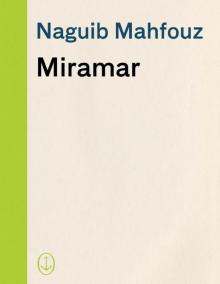 Miramar
Miramar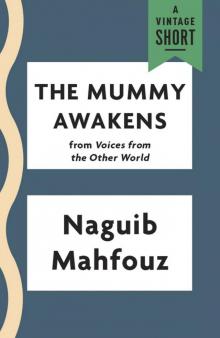 The Mummy Awakens
The Mummy Awakens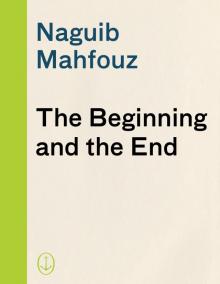 The Beginning and the End
The Beginning and the End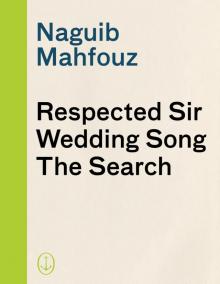 Respected Sir, Wedding Song, the Search
Respected Sir, Wedding Song, the Search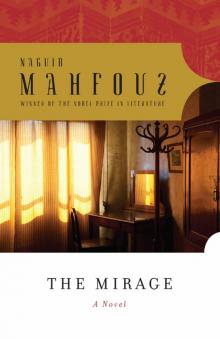 The Mirage
The Mirage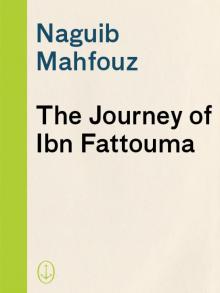 Novels by Naguib Mahfouz
Novels by Naguib Mahfouz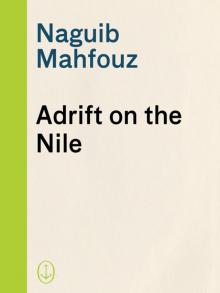 Adrift on the Nile
Adrift on the Nile Karnak Café
Karnak Café Heart of the Night
Heart of the Night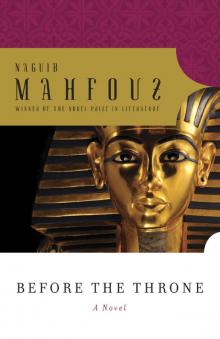 Before the Throne
Before the Throne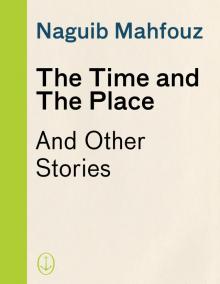 The Time and the Place: And Other Stories
The Time and the Place: And Other Stories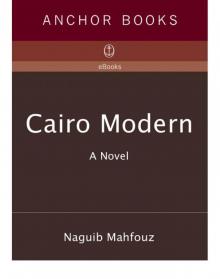 Cairo Modern
Cairo Modern Arabian Nights and Days
Arabian Nights and Days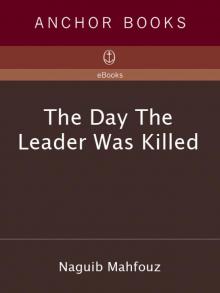 The Day the Leader Was Killed
The Day the Leader Was Killed Morning and Evening Talk
Morning and Evening Talk Three Novels of Ancient Egypt Khufu's Wisdom
Three Novels of Ancient Egypt Khufu's Wisdom Akhenaten: Dweller in Truth
Akhenaten: Dweller in Truth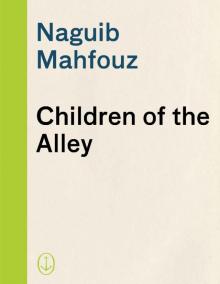 Children of the Alley
Children of the Alley Voices From the Other World
Voices From the Other World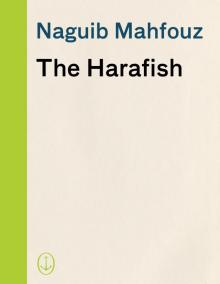 The Harafish
The Harafish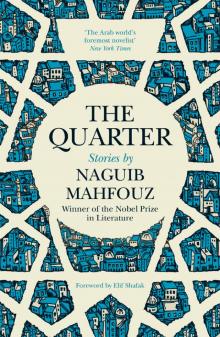 The Quarter
The Quarter The Seventh Heaven: Supernatural Tales
The Seventh Heaven: Supernatural Tales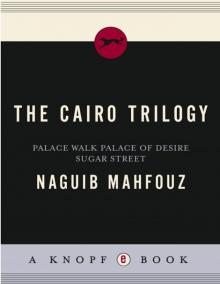 The Cairo Trilogy: Palace Walk, Palace of Desire, Sugar Street
The Cairo Trilogy: Palace Walk, Palace of Desire, Sugar Street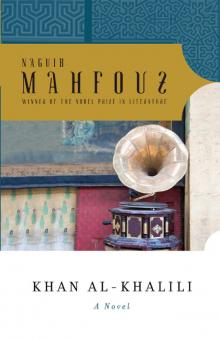 Khan Al-Khalili
Khan Al-Khalili Three Novels of Ancient Egypt Khufu's Wisdom, Rhadopis of Nubia, Thebes at War
Three Novels of Ancient Egypt Khufu's Wisdom, Rhadopis of Nubia, Thebes at War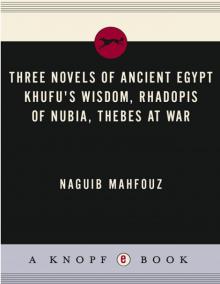 Three Novels of Ancient Egypt
Three Novels of Ancient Egypt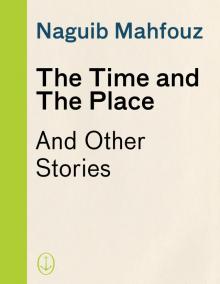 The Time and the Place
The Time and the Place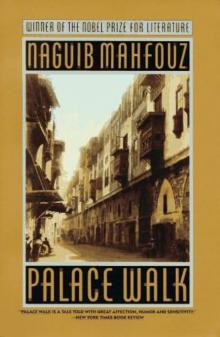 Palace Walk tct-1
Palace Walk tct-1 Akhenaten
Akhenaten The Seventh Heaven
The Seventh Heaven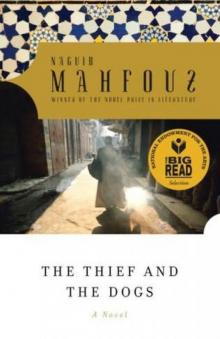 The Thief and the Dogs
The Thief and the Dogs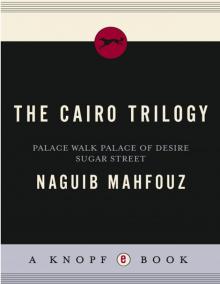 The Cairo Trilogy
The Cairo Trilogy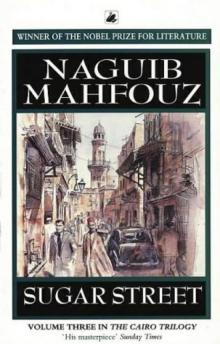 Sugar Street tct-3
Sugar Street tct-3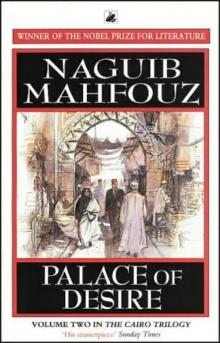 Palace of Desire tct-2
Palace of Desire tct-2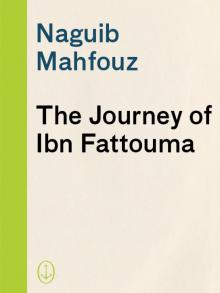 The Journey of Ibn Fattouma
The Journey of Ibn Fattouma